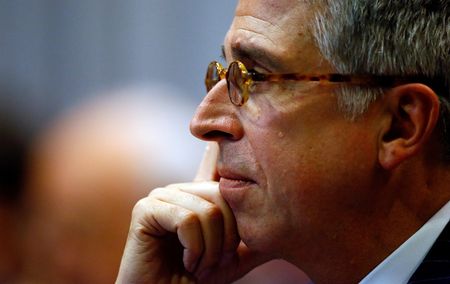PARIS/MILAN (Reuters) – Telecom Italia (TIM) said its biggest shareholder Vivendi on Monday relinquished its board seat, as Italy’s new government weighed options to take control of the debt-laden former phone monopolist’s landline grid.
Vivendi Chief Executive Arnaud de Puyfontaine resigned from the board amid discussions in Rome over ways to create a wholesale-only Italian broadband provider.
Italy’s right-wing government is expected to resume talks with Vivendi and TIM’s No.2 shareholder, state lender CDP, on Jan. 25 after a round of negotiations last year failed to yield a deal.
Meanwhile, TIM is looking to sell assets to reduce its debt pile, which stood at 25.5 billion euros at the end of September.
“In this phase of constructive dialogue between TIM’s main shareholders and the institutions under the new government leadership, it is fundamental that all the relevant parties may be free to work in a constructive and transparent manner to the benefit of TIM and all its shareholders,” a Vivendi spokesperson told Reuters.
Until “a new chapter” starts for TIM, de Puyfontaine will devote his efforts as CEO of TIM’s main shareholder “to re-establish a growth path for TIM and to have the real value of the company and its unique network properly recognised.”
Vivendi has said it would back TIM parting ways with its main asset only if the landline grid were adequately valued, leading to friction with CDP which has studied an offer for the grid that was later put on hold.
De Puyfontaine last month said he was grateful to the Italian government for creating conditions for constructive talks on the future of the Italian phone group.
On Monday, Vivendi reiterated that Italy remained at the core of its strategy.
People with knowledge of the matter said Vivendi was stepping up pressure on TIM CEO Pietro Labriola, adding that de Puyfontaine’s move was aimed at gaining more clout over TIM as part of a board reshuffle Vivendi has long advocated.
TIM’s board is due to meet on Wednesday.
A government source in charge of the TIM file told Reuters de Puyfontaine’s decision was a matter for the board and had no bearing on the discussions with the government.
(Reporting by Mathieu Rosemain in Paris, Elvira Pollina in Milan and Giuseppe Fonte in Rome; writing by Tassilo Hummel and Valentina Za; editing by Jan Harvey, Jason Neely, Bernadette Baum and Richard Chang)

